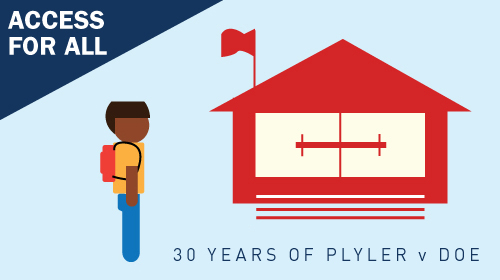
By Dr. William Lawrence, Principal, Foley Elementary, Foley, Alabama
For 15 years, I’ve served as principal of Foley Elementary in Alabama, a school that has become known in our Hispanic community as “La Escuela Amistosa” or the “Friendly School.” Our student population is 20 percent Latino, and we have many of our teachers that help many of these families with food, clothing and when needed even find housing and work. Foley Elementary is a trusted and safe place, and we’ve always welcomed all children and their families – without questioning immigration status. After all, we were hired to educate and love children, not serve as immigration officers.
The U.S. Supreme Court saw it that way, too. Thirty years ago this week, the high court ruled in Plyler v. Doe that all children should have equal access to public education, regardless of their citizenship or immigration status. It was a decision that protected not just children, but our American values.
Yet the lawmakers in my state have passed a law that I believe violates the spirit of that decision – HB 56, a “show-me-your-papers” law that mirrors Arizona’s SB 1070, which is currently before the U.S. Supreme Court. But HB 56 took it even further than Arizona’s law by adding a provision that would require public school officials to question every new enrollee on their legal status, and, in some cases, on the status of his or her parents.
When the law went into effect on September 29, the scene at my school was chaos. Many of our Latino children were arriving terrified. They worried their parents would be picked up and deported without ever getting a chance to say goodbye or make arrangements to see them again. That day, as my students came running off the buses in tears, it became clear to me that these children – almost all of whom American-born, U.S. citizens – were facing the brunt of the law. As parents came rushing to the school to withdraw their children, I was ashamed of what had been done.
I was not privy to the legislative discussions that lead to HB 56. I would hope that our legislators are telling the truth when they claim they did not realize some of the “unintended consequences” of the law, such has hurting our children. This law separates families. It separates mothers and fathers from their children. It hurts children that are citizens of the United States – who are terrified to live in their own country. Yet, despite the opportunity to repeal or amend the law to correct these “unintended consequences,” the legislature failed to do so, and the consequences remain.
On May 1, Assistant Attorney General Tom Perez sent a letter to Alabama’s education department detailing the damage done by the law. Since the law went into effect, it has led to the tripling of Hispanic student absentee rates, 13.4 percent of Hispanic children withdrawing from Alabama public schools and Hispanic parents in Alabama being unable to participate in their children’s education.
I’ve seen all this firsthand. The children in Alabama are in pain. They should not be suffering as an “unintended consequence.” The U.S. Supreme Court promised that all children will have equal access to public education. It’s time our state legislature ensures that they do.




